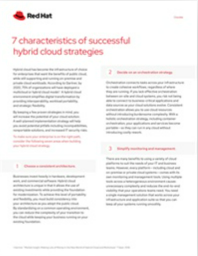7 Characteristics of Successful Hybrid Cloud Strategies
According to Gartner, by 2020, 75% of organizations will have deployed a multiload or hybrid cloud model. A hybrid cloud environment simplifies digital transformation by providing interoperability, workload portability, and strategic flexibility.
By keeping a few proven strategies in mind, you will increase the potential of your cloud solution. A well-planned implementation strategy will help you avoid potential pitfalls including incompatibilities, nonportable solutions, and increased IT security risks.
Read More
By submitting this form you agree to Red Hat contacting you with marketing-related emails or by telephone. You may unsubscribe at any time. Red Hat web sites and communications are subject to their Privacy Notice.
By requesting this resource you agree to our terms of use. All data is protected by our Privacy Notice. If you have any further questions please email dataprotection@techpublishhub.com
Related Categories: Applications, Cloud, Compliance, Digital transformation, ERP, Hardware, Hybrid Cloud, IT Security, Linux, Open Source, Operating System, Software, Storage


More resources from Red Hat

Discover How Organizations Speed AI/ML Adopti...
Turn your data into a valuable business asset and a competitive advantage. Artificial intelligence (AI) and machine learning (ML) technologies empl...

Enterprises Look to Open Source to Navigate t...
This IDC InfoBrief summarizes the findings of a global study to assess how enterprise IT infrastructure architecture strategies are evolving due ot...

Service Mesh Or API Management: Deploy A Comp...
Our increasingly digital world requires organizations to adapt their business and IT strategies, including application development and deployment. ...